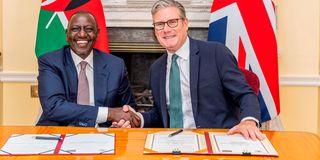UK opens door for more Kenya trade, toughens immigration rules

President William Ruto and United Kingdom Prime Minister Keir Starmer after signing the Kenya–UK Strategic Partnership pact at the 10 Downing Street in London, on July 1, 2025. PCS
Kenya and the United Kingdom have extended their pact for another five years, targeting 2030 as the year to double their trade and strengthen all facets of cooperation, but also tying Nairobi to be a major role player in London’s security needs.
The deal, known as the ‘Strategic Partnership’ involves five pillars of relations including trade and security, extending a tradition that effectively began at Kenya’s independence but was formalised five years ago.
President William Ruto and UK Prime Minister Keir Starmer inked the deal at the No.10 Downing Street in London, recommitting to what his predecessor Uhuru Kenyatta and then UK Prime Minister Boris Johnson signed in January 2020. That partnership will carry five key focal points including mutual prosperity; security and stability; sustainable development; climate change; and people-to-people relations and could be reworked or extended by 2030.
“We have renewed the Kenya–UK Strategic Partnership, effectively setting the right tempo for more trade, investment and green growth,” President Ruto said after the signing ceremony in London on Tuesday.
“This pact will also advance our shared development goals in climate, ICT and regional peace and security. With a promise to doubling our bilateral trade over the next five years, we are confident the cooperation will deliver tangible economic impact to our people.”
The UK and Kenya have been strong trading partners, seeing volumes of goods and services worth $2.47 billion (£1.8 billion, Ksh320 billion) in 2024 and a steady rise of 10 percent per year.
This week, Kenya Airways was to launch direct flights to London Gatwick, the second airport for the Kenyan carrier, which could see it double its direct flights.
But now the UK has bigger problems it wants Kenya to help address -- what it calls the “scourge of illegal migration.”
A dispatch from the UK Prime Minister’s Office said both countries would work together to drive economic growth and strengthen regional security.
“Turning to migration, the Prime Minister and President welcomed a new UK-Kenya security agreement to disrupt organised immigration crime and human trafficking in Kenya to prevent onward migration to Europe,” the Office said.
Security Strategy
Last week, the UK published its Security Strategy on “navigating an era of radical uncertainty,” seeing confrontation, competition and cooperation are all interwoven.
And while London said its primary focus is on the Western hemisphere, it identified countries such as Kenya and Nigeria in Africa as critical to step certain problems it faces “from the south.”
“We will also need to forge closer partnerships with countries in Africa given its rapidly growing and young population, and opportunities for growth and trade,” the Strategy says.
“In particular, we will need to help mitigate threats from instability on NATO’s southern flank in what is an increasingly geopolitically competitive continent. Our Strategic Security and Defence Partnerships with Nigeria, Kenya and Ghana, for example, help to deliver on UK interests at home while building African capability – allowing for cooperation across a broad spectrum of threats, including terrorism, serious and organised crime, hybrid threats and maritime issues.”
Earlier in May, the UK’s Defence Strategy had listed Kenya among its crucial partners: “The UK continues to support strategic partners in Africa, promoting peace and stability through focused defence education, training, and capacity-building, and addressing ‘upstream threats’ to UK interests.”
Both countries say they want to double trading volumes and see more UK investments rise from the current ($1.067 billion to nearly $2.06 billion -- Ksh266 billion). That includes the Nairobi Railway City project, which has been under discussion since 2022 and could cost $230 million.
Both Nairobi and London say the partnership of 2020 has worked somehow, in spite of some controversies, especially related to the discipline of British troops training in Kenya.
They cite the beginning of the Africa Green Industrialisation Initiative (AGII) worth £17 billion ($23 billion); the establishment of the Railway city secretariat; and the launch of Dhamana Guarantee company for climate financing.
They also cite a continuity agreement on trade after the UK exited the European Union, the countries also signed the Defence Cooperation Agreement and continued cooperation to combat violent extremism and other organised crimes.
The UK, which sees unchecked immigration as a burden, has sought bilateral labour agreements with its partners including Kenya, requiring Kenyan migrant workers to only seek to settle in the UK on a clear-cut government-endorsed basis.


